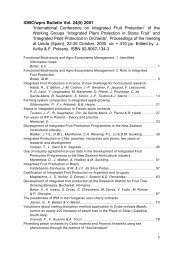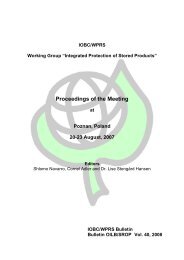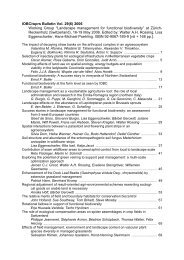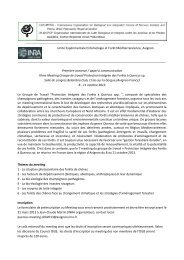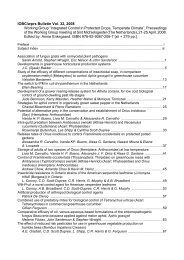Classical and augmentative biological control against ... - IOBC-WPRS
Classical and augmentative biological control against ... - IOBC-WPRS
Classical and augmentative biological control against ... - IOBC-WPRS
Create successful ePaper yourself
Turn your PDF publications into a flip-book with our unique Google optimized e-Paper software.
Chapter 7<br />
Business profitability<br />
Comparing estimated production <strong>and</strong> other costs, relative to the sales value at plateau level, points<br />
out large differences between chemical pesticides <strong>and</strong> microbial bio<strong>control</strong> agents (Table 17). The<br />
gap between the two in terms of estimated profit is nearly 10-fold in favour of the chemical<br />
industry.<br />
Table 17: Compared margin structure estimates for the production <strong>and</strong> sales of a microbial<br />
bio<strong>control</strong> agent (MBCA) <strong>and</strong> a chemical pesticide (source IBMA)<br />
%* Chemical pesticide MBCA<br />
Sales value at plateau level 100 100<br />
Costs of production 21 56<br />
Gross margin 79 44<br />
Cost of sales 21 15<br />
Cost of research 8 12<br />
Cost of administration 4 3<br />
Earnings before investments taxes<br />
46 14<br />
<strong>and</strong> amortisation (EBITA)<br />
Profit after taxes, provisions <strong>and</strong><br />
18 2<br />
amortisation<br />
* costs <strong>and</strong> margins are expressed as percent of the sales value of the commercial product<br />
Conclusion <strong>and</strong> outlook for industry<br />
These data show clearly that the profitability of a bio<strong>control</strong> business is much less attractive than<br />
that of chemical pesticides <strong>and</strong> may explain why the large chemical companies decided in the 90’s<br />
to retreat from this business. Although these companies show presently some new signs of interest,<br />
they seem to remain basically reluctant to re-enter despite the new attractiveness of a fast growing<br />
bio<strong>control</strong> market. Contrary to European <strong>and</strong> US-based companies, several Japanese firms, such as<br />
Sumitomo chemicals or Mitsui appear to have invested for a potential long term return. Taking<br />
advantage of the divestment by the chemical majors, they have been able to acquire a good business<br />
basis at very attractive conditions. This should enable them to consider optimistically the future<br />
development of the bio<strong>control</strong> industry <strong>and</strong> its positive trend.<br />
The smaller companies which have invested in this business <strong>and</strong> try to overcome their financial<br />
problems have only two alternatives:<br />
- Either develop, often at a loss, into larger markets (grapevine, field crops etc), if they can. In<br />
order to sustain these efforts, they will need a strong support from venture capital<br />
companies;<br />
- or enter into venture agreements with other manufacturers/suppliers, in order to build up a<br />
product portfolio which will make them successful in the future.<br />
61






